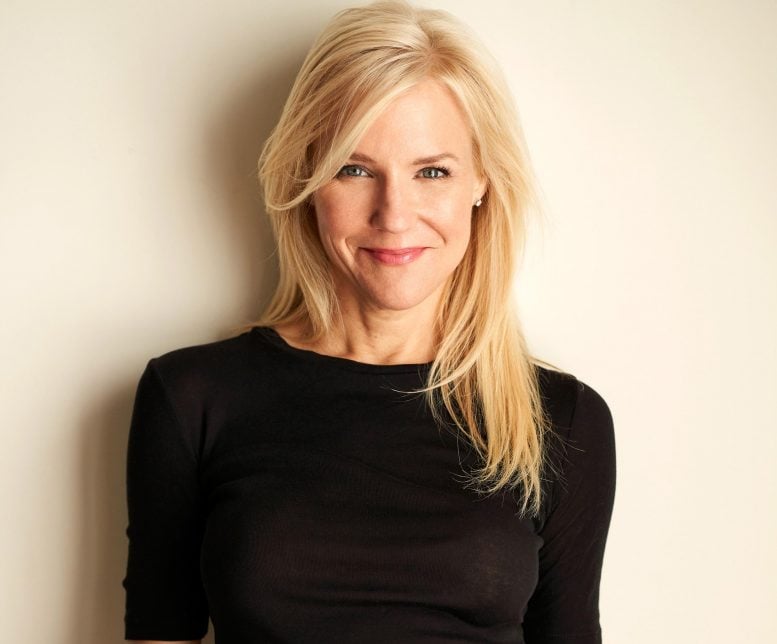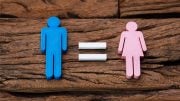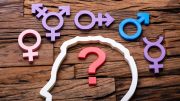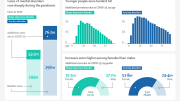
COVID-19 and the US response are predicted to deeply impact families, work, relationships, and gender roles for years.
COVID-19 and America’s response to it are likely to profoundly affect our families, work lives, relationships, and gender roles for years, say 12 prominent scientists and authors who analyzed 90 research studies and used their expertise to evaluate our reaction to the pandemic and predict its aftermath.
The group, which included several UCLA researchers, foresees enduring psychological fallout from the crisis, even among those who haven’t been infected. Their predictions and insights, published on October 22, 2020, in the journal Proceedings of the National Academy of Sciences, include:
- Planned pregnancies will decrease in a disease-ridden world, birthrates will drop, and many couples will postpone marriage, said senior author and UCLA professor of psychology and communication studies Martie Haselton.
- People who are single are less likely to start new relationships. Women who can afford to be on their own are likely to stay single longer, Haselton said.
- With children home due to the pandemic, women are spending more time providing care and schooling, are less available for paying work and may come to rely more on male partners as breadwinners, Haselton said. This will push us toward socially conservative gender norms and potentially result in a backslide in gender equality.
- Unlike many past crises, this pandemic is not bringing people closer together and, despite some exceptions, it is not producing an increase in kindness, empathy, or compassion, especially in the U.S., said lead author Benjamin Seitz, a UCLA psychology doctoral student with expertise in behavioral neuroscience.
- “Our species is not wired for seeking a precise understanding of the world as it actually is,” the authors write, and our tribal predispositions toward groupthink are resulting in the large-scale spread of misinformation We tend to seek out data that supports our opinions, and we too often distrust health experts, they say.
“The psychological, social and societal consequences of COVID-19 will be very long-lasting,” Haselton said. “The longer COVID-19 continues, the more entrenched these changes are likely to be.”

COVID-19 and America’s response to it will profoundly affect our families, work lives, relationships and gender roles for years, say prominent scientists and authors who analyzed 90 research studies and used their expertise to predict its aftermath. Among the predictions: Planned pregnancies will decrease in a disease-ridden world, birthrates will drop, and many couples will postpone marriage, said senior author and UCLA Professor of Psychology Martie Haselton. Credit: Jeff Berlin
COVID-19: A worldwide social experiment
As marriage rates plummet and people postpone reproduction in a virus-plagued world, some nations’ populations will shrink and fall precipitously below “replacement level,” the authors write. These birthrate drops, in turn, can have cascading social and economic consequences, affecting job opportunities, straining the ability of countries to provide a safety net for their aging populations, and potentially leading to global economic contraction.
Research has shown that even before the pandemic, women were more stressed than men by family and job responsibilities. Now they are managing more household responsibilities related to child care and education. In medicine and other sciences, women scholars are already publishing substantially less research than they did a year ago, while men are showing increased productivity, Haselton said.
She and her co-authors foresee a shift toward social conservatism. A consequence of the pandemic could be less tolerance for legal abortion and the rights for sexual minorities who don’t align with traditional gender roles. In addition, in a time of economic inequality, many women will sexualize themselves more to compete with one another for desirable men, Haselton said.
People who meet online will often be disappointed when they meet in person. “Does a couple have chemistry? You can’t tell that over Zoom,” Haselton said. In new relationships, people will miss cues, especially online, and the disappointing result will often be over-idealization of a potential partner — seeing the person the way you want the person to be rather than the way the person actually is.
The pandemic has become a worldwide social experiment, say the authors, whose areas of expertise include psychology, neuroscience, behavioral science, evolutionary biology, medicine, evolutionary social science, and economics.
An evolutionary struggle
For the study, the authors used an evolutionary perspective to highlight the strategies the virus has evolved to use against us, the strategies we possess to combat it, and the strategies we need to acquire.
Humans today are the products of social and genetic evolution in environments that look very little like our current world. These “evolutionary mismatches” are likely responsible for our frequent lack of alarm in response to the pandemic, the scientists write.
Americans in particular value individuality and the ability to challenge authority. “This combination does not work especially well in a pandemic,” Seitz said. “This virus is exposing us and our weaknesses.”
Haselton agreed, calling the virus “wily” for its ability to infect us through contact with people we love who seem to be healthy. “Our social features that define much of what it is to be human make us a prime target for viral exploitation,” she said. “Policies asking us to isolate and distance profoundly affect our families, work lives, relationships and gender roles.”
All infectious agents, including viruses, are under evolutionary pressure to manipulate the physiology and behavior of their hosts — in this case, us — in ways that enhance their survival and transmission. SARS-CoV-2, which causes COVID-19, may be altering human neural tissue to change our behavior, the authors say. It may be suppressing feelings of sickness, and perhaps even enhancing our social impulses, during times of peak transmissibility before symptoms appear. People who are infected but do not feel sick are more likely to go about their usual activities and come in contact with others whom they might infect.
Disgust is useful and motivates us to avoid people who display clear signs of disease — such as blood, pale skin, lesions, yellow eyes or a runny nose. But with COVID-19 infections, this is not what most people see. Family, friends, co-workers and strangers can look perfectly healthy and be asymptomatic for days without knowing they are infected, the authors note.
It may sound counterintuitive, but normal brain development requires exposure to a diverse set of microbes to help prepare younger animals for a range of pathogenic dangers they may encounter in adulthood. But safer-at-home and quarantine health measures have temporarily halted social activities that would otherwise bring millions of adolescents into contact with new microbes. As a result, children and adolescents whose immune systems and brains would, in normal times, be actively shaped by microbial exposures may be adversely impacted by this change, the scientists say.
By understanding how SARS-CoV-2 is evolving and having behavioral and psychological effects on us that enhance its transmission, we will be better able to combat it so it becomes less harmful and less lethal, the authors write.
Reference: “The pandemic exposes human nature: 10 evolutionary insights” by Benjamin M. Seitz, Athena Aktipis, David M. Buss, Joe Alcock, Paul Bloom, Michele Gelfand, Sam Harris, Debra Lieberman, Barbara N. Horowitz, Steven Pinker, David Sloan Wilson and Martie G. Haselton, 22 October 2020, Proceedings of the National Academy of Sciences.
DOI: 10.1073/pnas.2009787117
Co-authors of the study are Steven Pinker of Harvard University, bestselling author Sam Harris, Barbara Natterson-Horowitz of the David Geffen School of Medicine at UCLA, Paul Bloom of Yale University, Athena Aktipis of Arizona State University, David Buss of the University of Texas, Joe Alcock of the University of New Mexico, Michele Gelfand of the University of Maryland and David Sloan Wilson of the State University of New York at Binghamton.










Interesting.
Some assumptions are probably faulty. For e.g. , the assumption that women are the weaker sex and the Virus ill be a set back for woman emancipament is flawed in my personal opinion. Not only are they far stronger than males both medicaly, physically and psychologically, they probably can adapt rapidly to this and future viruses and pandemics. They are less likely to be infected and the article showing that birth rates of females is higher in liberal Canada vis-a-vis normal ratio of males and female in the Consevative heartland is an indicator that Mother Nature is already on the Job and skewing the survival likelihood of the human species.
I also remembers reading an article that women may not need the male of the species to reproduce! Always wondered if the Amazonian Women in South America had males in their midst. Also, another mystery was the ccomplete disappearance of an entire civilization in South America with no sign of their remains except for the structures constructed by them.
Similarly many other assumptions can be questioned as the asumption that a cure for this and future pandemics cannot be found in the immediate future may be faulty.
Feminism has been militating against marriage by pushing for laws that put all the risk on males, while making is constructively illegal to court a female- you can find something in every relationship (not asking consent for the umpteenth time every time) that will land the male in prison. Women want to marry a guy who makes more but can’t find any these days- the “wage gap” not withstanding. Weddings are ridiculously expensive party’s where one person is the center of attention. The whole thing is an anachronism
Good evening! Guys, I can finally answer a very common question! I finally got the best gay dating sites! There is a list of proven and reliable services! I managed to find several partners for myself and I feel great! I wish you, too, to meet and communicate! Good luck!
The most interesting stories happened to me when I, like a real male, went out to meet girls, but now this virus is not allowed to walk in clubs and restaurants. I have to get acquainted on the Internet, it’s good that a friend advised the Internet dating site https://www.matchtrace.com/best-local-hookup-sites/ here, the artificial intelligence program very quickly selects a partner and you can spend time together. The virus has defeated the dating site.
What do you think about internet dating sites? They recommended the bdsmdating page. I want to know the opinion of my colleagues to meet people via the internet, what is the best thing one can do to hang out with the people who are on that page and above all What kind of people should we meet to agree on how to get out of this situation.
Hello
How did you manage to post here?